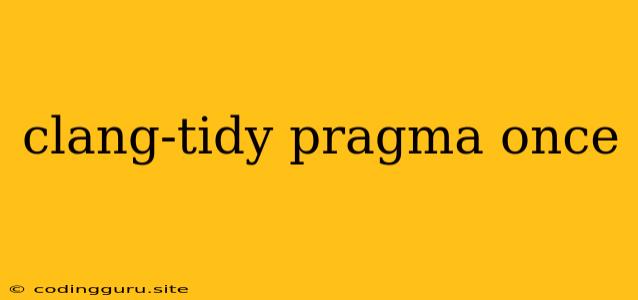Understanding clang-tidy and pragma once for Efficient C++ Code
In the world of C++ development, efficiency and maintainability are paramount. Two powerful tools that contribute significantly to these goals are clang-tidy and pragma once. This article will delve into the workings of each and explore how they can be combined to create cleaner, more robust C++ code.
What is clang-tidy?
clang-tidy is a static analysis tool that helps identify potential issues and bugs in your C++ code before you even compile it. It leverages the power of Clang, a C/C++ compiler front-end, to perform extensive code analysis and provide detailed reports on areas needing improvement.
How does clang-tidy work?
clang-tidy uses a set of predefined checks, called "checks," to analyze your code. These checks are designed to detect various issues, including:
- Style violations: Inconsistencies in coding style, such as improper indentation or inconsistent naming conventions.
- Potential bugs: Code that might lead to errors at runtime, such as memory leaks or undefined behavior.
- Performance bottlenecks: Code segments that could be optimized for better performance.
Benefits of using clang-tidy:
- Early bug detection: Identify and fix potential issues early in the development cycle, saving time and effort.
- Code quality improvement: Enforce consistent coding style and identify areas for optimization, resulting in cleaner, more maintainable code.
- Reduced maintenance costs: Proactively address potential problems, reducing the likelihood of costly bugs surfacing later in the development process.
What is pragma once?
pragma once is a preprocessor directive used in C++ to ensure that a header file is included only once in a compilation unit. This directive is an effective way to avoid multiple inclusions of the same header file, which can lead to compilation errors and code duplication.
How does pragma once work?
When the preprocessor encounters a pragma once directive in a header file, it checks for the existence of a flag associated with that file. If the flag is not set, the preprocessor includes the header file and sets the flag. If the flag is already set, the preprocessor skips the header file, preventing its inclusion again.
Benefits of using pragma once:
- Avoid multiple inclusions: Prevents duplicate declarations and definitions, simplifying the compilation process and avoiding potential errors.
- Improved performance: Reduces compilation times by avoiding unnecessary processing of redundant code.
- Enhanced code readability: Contributes to cleaner and more organized code, making it easier for developers to understand and maintain.
Combining clang-tidy and pragma once for Optimal Results
The combination of clang-tidy and pragma once forms a powerful duo for ensuring efficient and robust C++ code. clang-tidy can analyze your code to identify potential issues, while pragma once helps prevent multiple inclusions of header files, contributing to cleaner and more efficient compilation.
Example:
// my_header.h
#pragma once
class MyClass {
public:
void myFunction();
};
In this example, the pragma once directive ensures that my_header.h is included only once in a compilation unit. When clang-tidy analyzes this code, it will check for potential issues within the class definition and its associated function, providing valuable feedback for improvement.
Tips for Effective Use
- Configure
clang-tidy: Customizeclang-tidyto suit your specific project needs by enabling or disabling certain checks. - Integrate with your build system: Integrate
clang-tidyinto your build process for automatic code analysis during each compilation. - Address warnings: Take
clang-tidywarnings seriously and fix any issues identified by the tool. - Use
pragma onceconsistently: Always includepragma oncein your header files to ensure proper handling of multiple inclusions.
Conclusion
clang-tidy and pragma once are invaluable tools for C++ developers. By leveraging the power of static analysis and preventing redundant header inclusions, these techniques contribute significantly to code quality, efficiency, and maintainability. Embrace these tools to build cleaner, more robust, and error-free C++ code.
